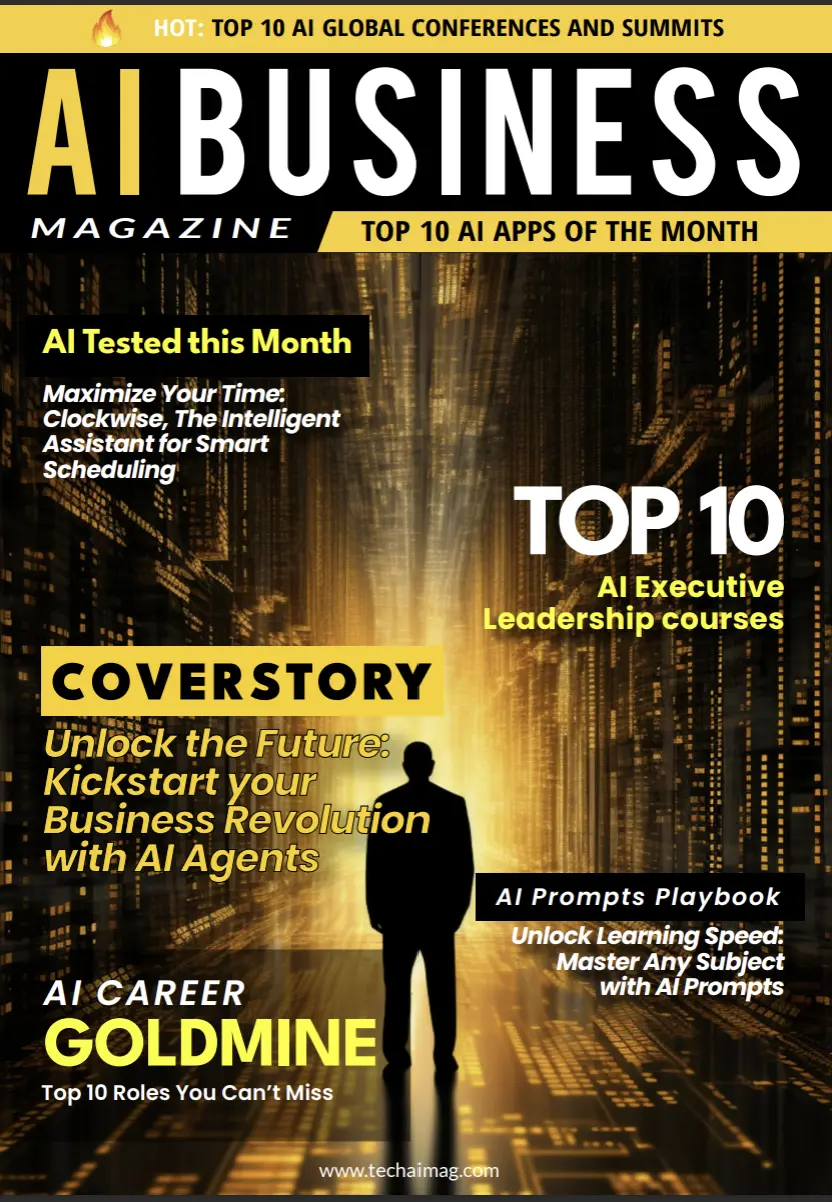Introduction
Imagine having a PhD-level research assistant at your fingertips—one that never sleeps, never tires, and can process hundreds of sources in minutes. This sci-fi fantasy is now reality with OpenAI’s groundbreaking Deep Research, launched recently in ChatGPT. In a world drowning in information but starving for insight, Deep Research cuts through the noise by transforming what would take humans many hours of intensive research into a seamless process completed in mere minutes.
As finance professionals crunch market data, scientists wade through journal articles, and engineers seek innovative solutions, Deep Research emerges as the ultimate co-pilot for knowledge workers. What exactly is this revolutionary AI system, how does it work behind the scenes, and could it fundamentally reshape how we discover and apply knowledge?
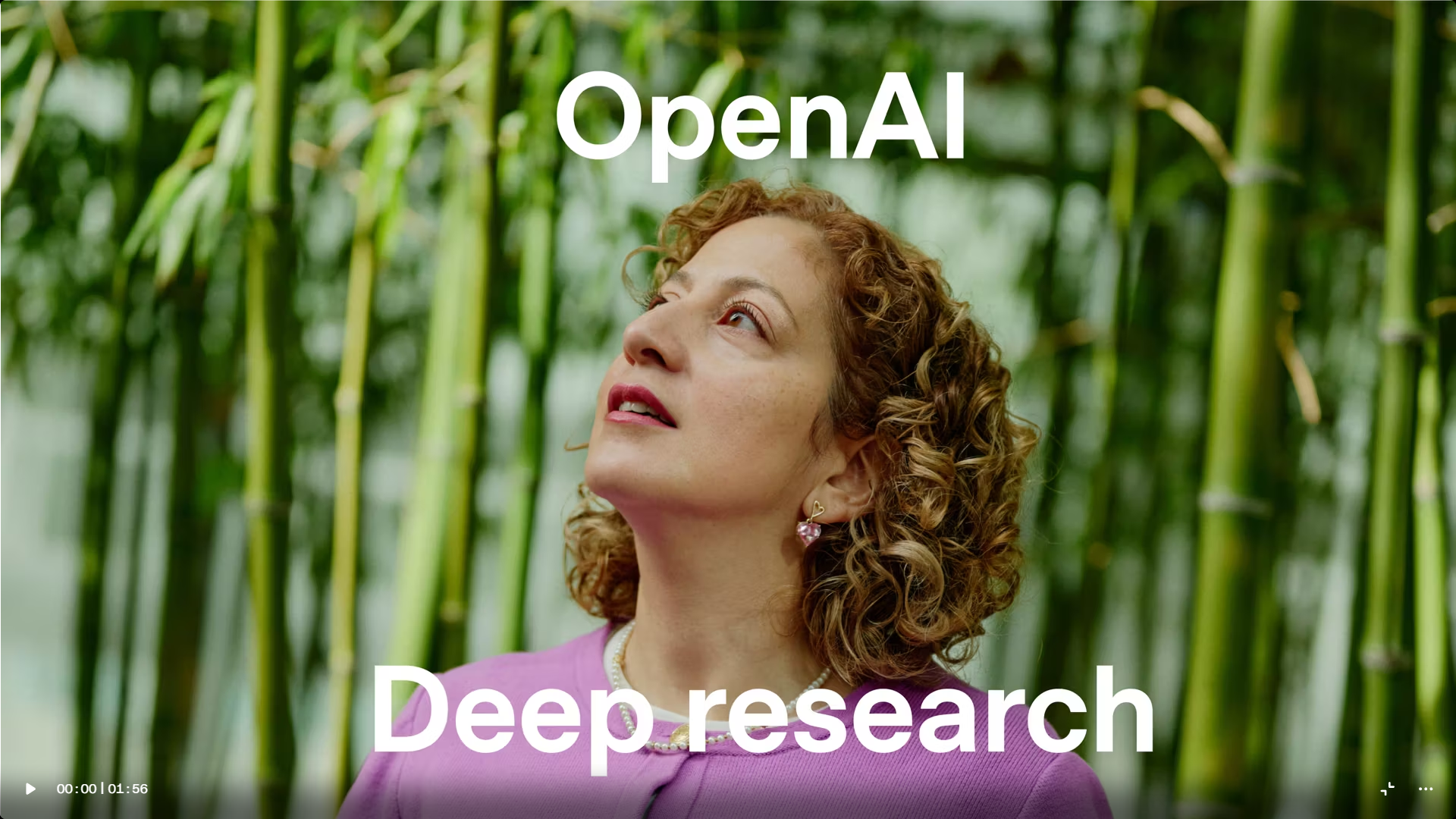
What is Deep Research?
Deep Research isn’t just another AI tool—it’s OpenAI’s most sophisticated agentic AI system, specifically engineered to conduct comprehensive research independently. Unlike conventional AI assistants that merely retrieve or summarize information, Deep Research actively hunts, interprets, and analyzes massive volumes of text, images, and PDFs across hundreds of online sources, producing meticulously detailed reports rivaling those of professional research analysts.
Powered by a specialized version of the upcoming OpenAI o3 model optimized for web browsing and data analysis, Deep Research doesn’t follow rigid pathways. Instead, it thinks on its feet, adapting research strategies based on discoveries—much like an experienced human researcher following leads and pivoting when needed.
OpenAI emphasizes that effective knowledge synthesis is the foundation for creating new knowledge, positioning Deep Research as a significant stepping stone toward their ambitious goal of developing Artificial General Intelligence (AGI) capable of generating novel scientific discoveries.
Who Benefits from Deep Research?
Deep Research offers transformative value across diverse professional landscapes:
- Financial analysts poring over market trends and investment opportunities can now distill critical insights from vast data sets in a fraction of the time.
- Scientific researchers searching for connections across disparate studies can discover non-obvious patterns that might otherwise remain hidden.
- Policy experts attempting to synthesize complex regulatory environments can quickly generate comprehensive overviews with proper citations.
- Engineers tackling technical challenges can rapidly survey existing solutions across numerous domains.
- Savvy consumers making significant purchases—from homes to vehicles to appliances—can receive tailored recommendations based on extensive market analysis.
How does Deep Research democratize professional research? Deep Research democratizes access to professional-grade research capabilities by compressing hours of expert work into minutes, leveling the playing field between resource-rich organizations and smaller players with limited time and staff.
When Will Deep Research Transform Knowledge Work?
The transformation isn’t coming—it’s here. OpenAI has already released Deep Research to Pro users, with a carefully orchestrated rollout planned for Plus and Team users next, followed by Enterprise customers. Currently available on ChatGPT’s web interface, mobile and desktop versions will arrive within weeks.
Plus, users can anticipate access approximately one month from launch, assuming safety metrics continue meeting OpenAI’s rigorous standards. While initially unavailable in the UK, Switzerland, and the European Economic Area, geographical expansion is actively underway.
Early adopters are already experiencing the impact—tasks that once dominated entire workdays now complete during coffee breaks. The immediate productivity gains are substantial, but the long-term implications may be even more profound as knowledge workers realign their skills toward higher-level analysis and creative problem-solving.
Where Will Deep Research Make the Most Impact?
Deep Research shines brightest in scenarios where depth, thoroughness, and documentation are paramount:
- Multi-dimensional market analyses requiring synthesis of competitor strategies, consumer trends, and technological developments across fragmented sources.
- Scientific literature reviews demand evaluation of methodologies, findings, and implications across hundreds of research papers.
- Technical feasibility assessments comparison of multiple approaches and technologies with clear tradeoff analysis.
- Consumer research for high-investment purchases where detailed comparison across numerous attributes determines optimal choices.
While GPT-4o excels at real-time conversation, Deep Research transforms research from quick summaries into comprehensive, meticulously documented analyses—the difference between a hasty sketch and a detailed blueprint.
How Does Deep Research Work?
Under the hood, Deep Research operates through a sophisticated architecture built on cutting-edge AI techniques:
- Reinforcement learning mastery: Trained on challenging browsing and reasoning tasks across numerous domains, Deep Research has learned to orchestrate multi-step research processes with remarkable fluidity.
- Dynamic adaptation: Unlike rigid systems, Deep Research constantly reassesses its path, backtracking and redirecting based on new information—much like a detective following evolving leads.
- Multi-modal intelligence: By seamlessly processing both textual and visual information, Deep Research captures nuances often missed by text-only systems.
- Analytical firepower: Through Python integration, Deep Research creates and refines data visualizations, transforming raw numbers into actionable insights.
- Meticulous documentation: Every claim comes with clear sourcing, offering an auditable trail that makes verification straightforward.
The user experience is refreshingly straightforward. Here’s a step-by-step breakdown of the process:
- Select “Deep Research: Open ChatGPT’s message composer and choose the “Deep Research” option.
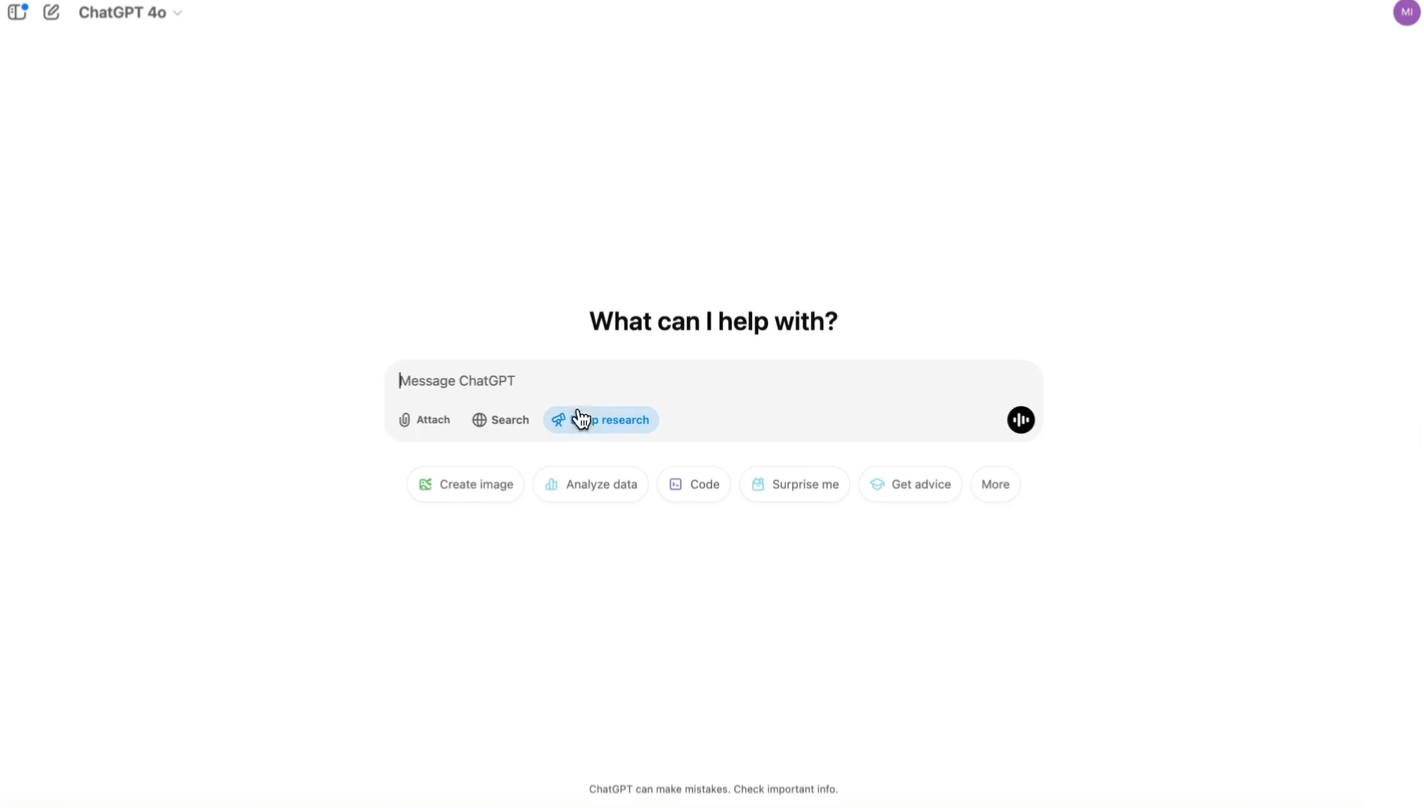
- Submit Your Query: Enter your question or topic that you need detailed information or insights on.
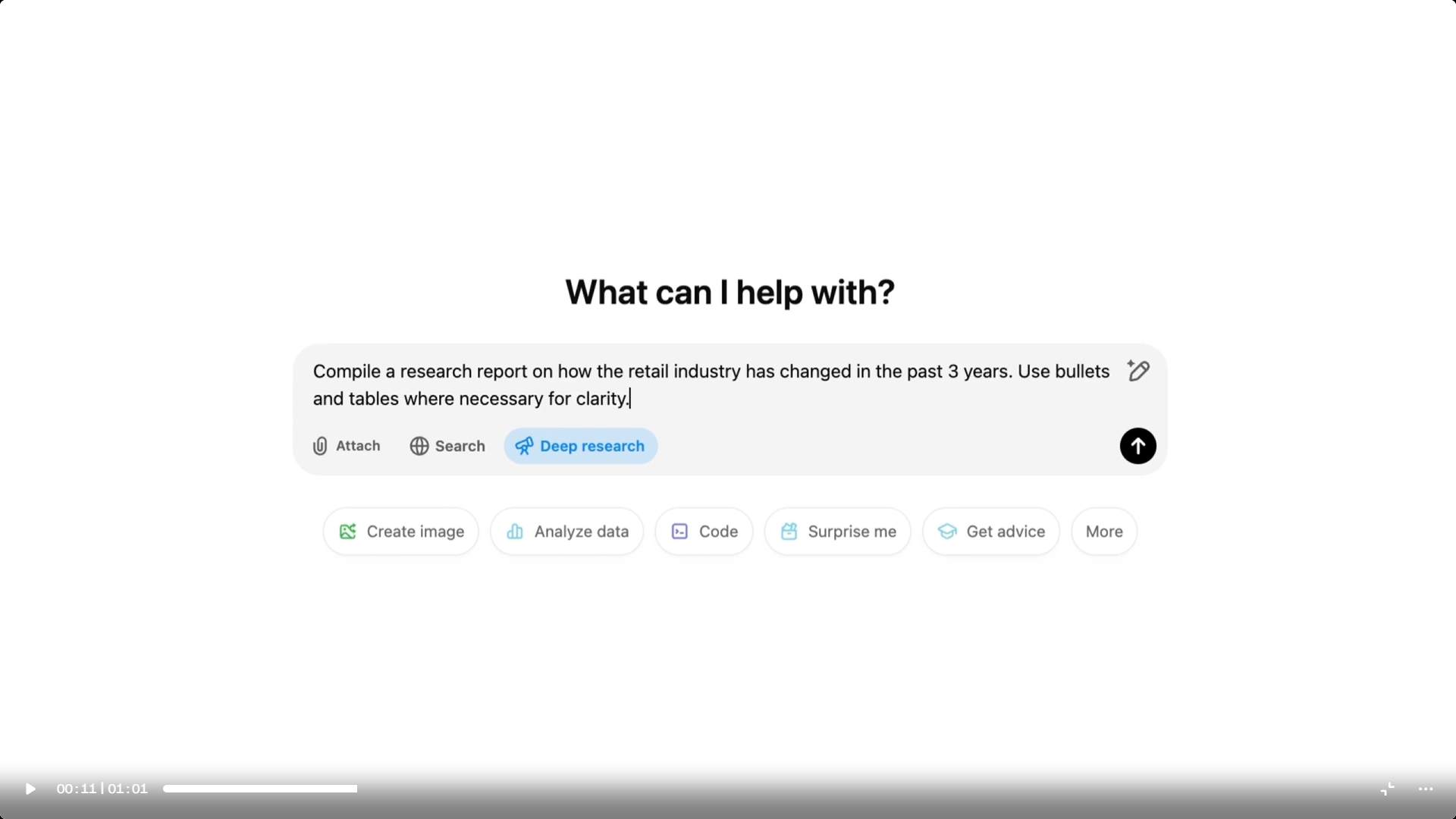
- Track Progress in the Sidebar: Observe the real-time sidebar that displays the current status of the research and sources being explored.
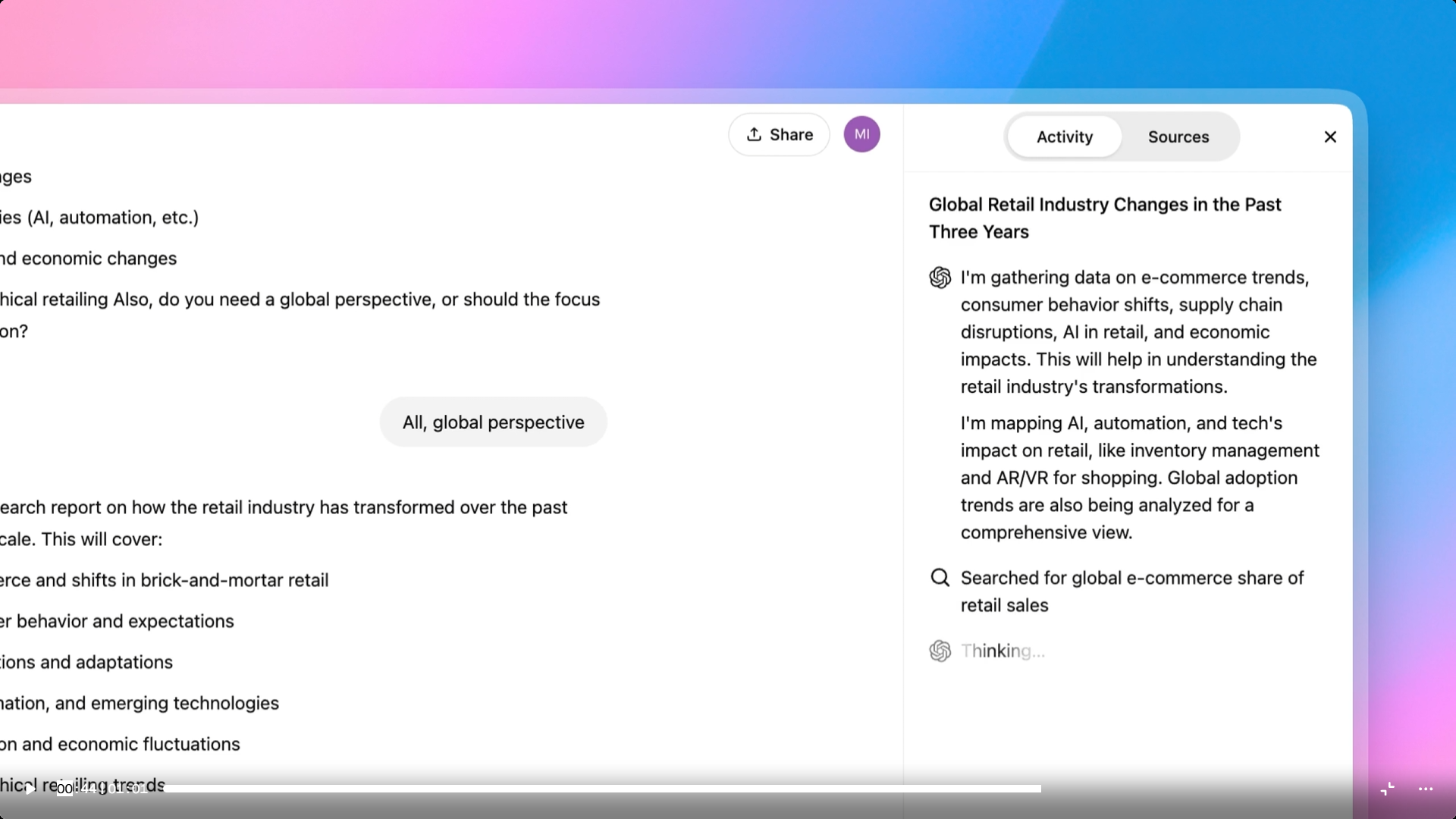
- Receive a Comprehensive Report: Once the research is complete, you’ll receive a detailed report addressing your question or topic.
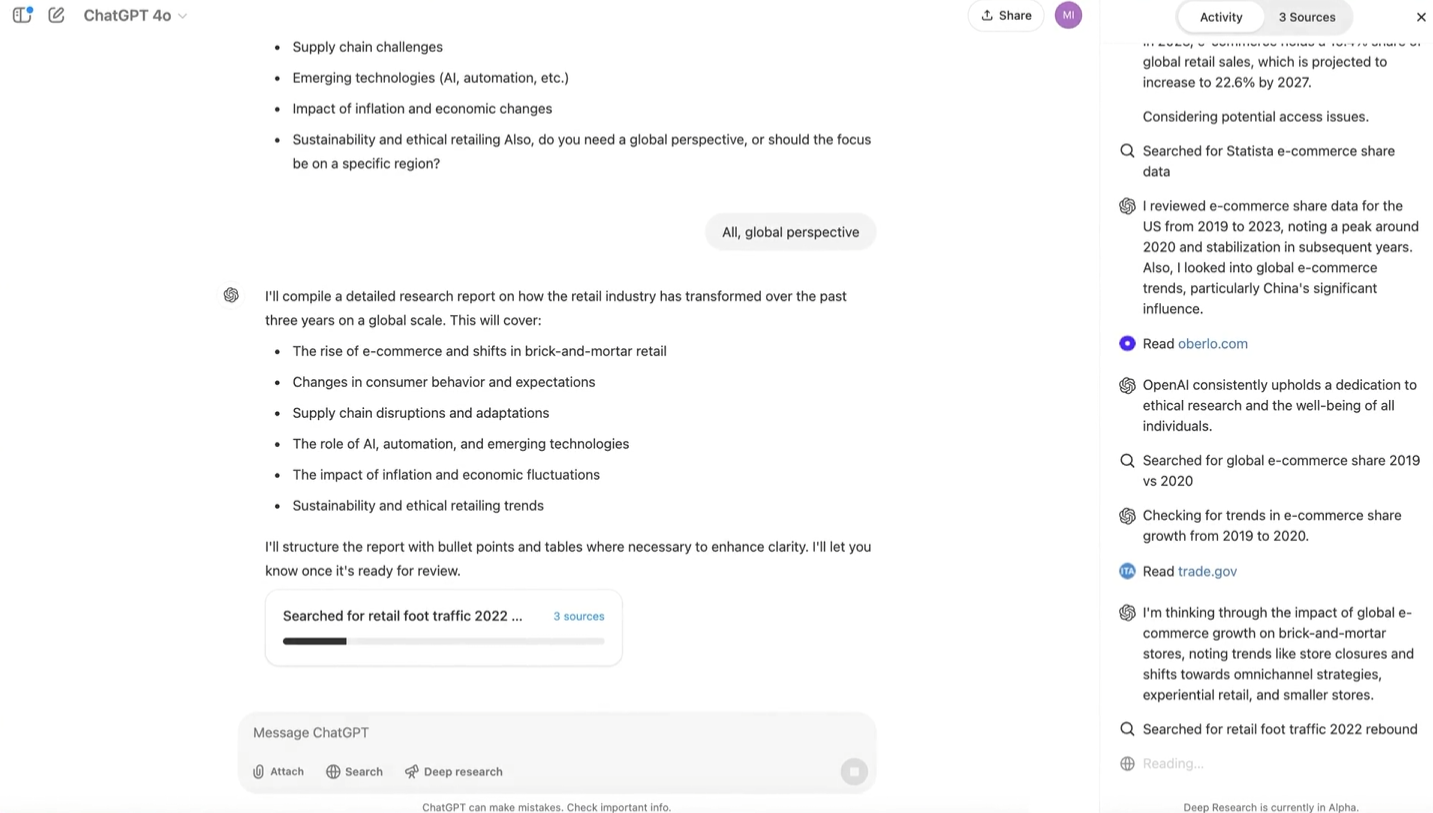
In the coming weeks, OpenAI plans to enhance these reports with embedded visuals, data visualizations, and additional analytical outputs, further elevating their utility for professional contexts.
Performance Benchmarks: Demonstrating Advanced Capabilities
1. Humanity’s Last Exam
To validate the advanced capabilities of the model powering Deep Research, OpenAI subjected it to rigorous evaluations. Notably, on “Humanity’s Last Exam,” a challenging evaluation that tests AI across a broad range of subjects at expert levels, the latest model achieved a new high score of 26.6% accuracy. This test, comprising over 3,000 multiple-choice and short-answer questions spanning more than 100 subjects—from linguistics to rocket science—showcased the model’s ability to effectively seek and synthesize specialized information. Compared to OpenAI o1, significant gains were observed in chemistry, humanities, social sciences, and mathematics.
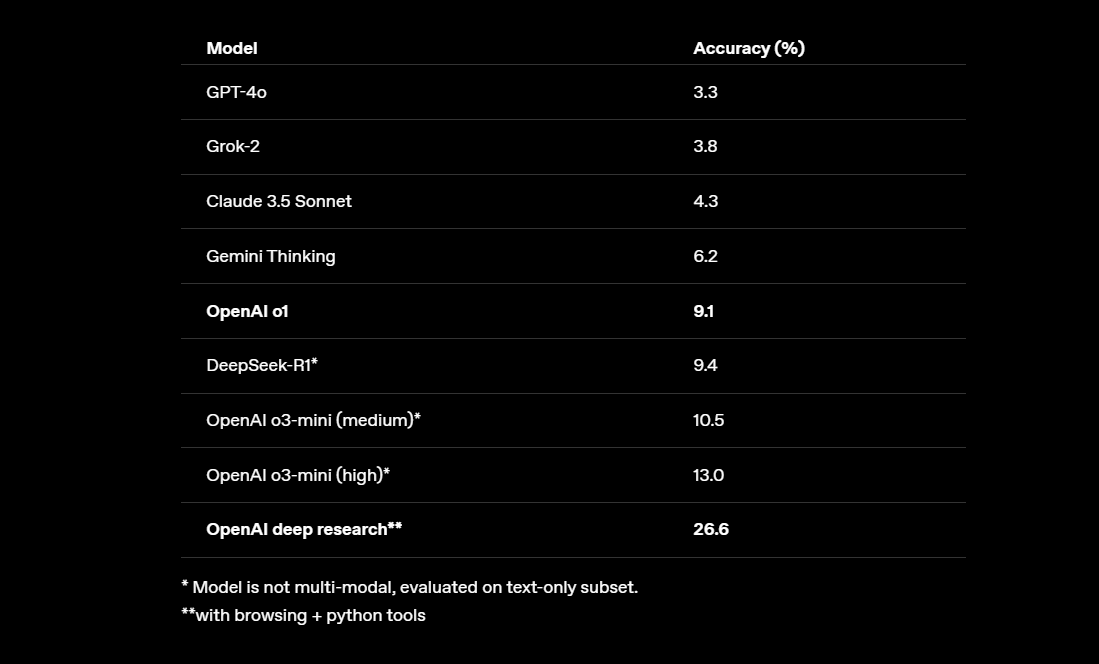
2. GAIA
Furthermore, on “GAIA,” a public benchmark evaluating AI on real-world questions requiring reasoning, multi-modal fluency, web browsing, and tool-use proficiency, the model reached a new state-of-the-art (SOTA), topping the leaderboard. These results underscore Deep Research’s enhanced capacity to handle complex, real-world information retrieval and analysis tasks.
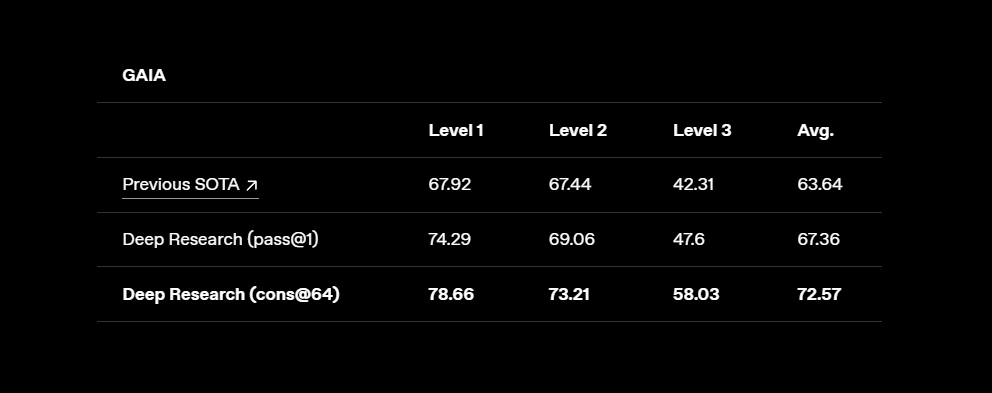
Pros and Limitations
Deep Research offers compelling advantages for knowledge workers:
Pros:
- Time compression: Tasks requiring full days now complete in under an hour, dramatically increasing productivity.
- Comprehensive coverage: The system explores hundreds of sources simultaneously, far exceeding human capacity within comparable timeframes.
- Rigorous documentation: Every assertion comes with proper citation, enabling verification and deeper exploration.
- Adaptive intelligence: The system’s ability to pivot based on discoveries mimics expert human research strategies.
- Visualization capabilities: Integrated data analysis and graphing unlock deeper insights from complex information.
Limitations:
- Occasional factual errors: Deep Research can sometimes introduce inaccuracies, though at significantly lower rates than standard ChatGPT models.
- Source evaluation challenges: Distinguishing authoritative information from rumor remains an evolving capability.
- Confidence calibration: The system sometimes struggles to accurately express uncertainty about its findings.
- Formatting inconsistencies: Initial users may encounter minor presentation issues in reports and citations.
- Resource intensity: The system’s computational demands currently limit access and may affect processing times.
OpenAI acknowledges these limitations while emphasizing rapid improvement through increased usage and ongoing development.
Future Developments
OpenAI’s roadmap for Deep Research reveals ambitious plans:
- A streamlined, more efficient version using a smaller but highly capable model will soon provide higher rate limits for all paid users.
- Coming enhancements will enable connection to specialized data sources, including subscription services and internal knowledge bases.
- Mobile and desktop integration will arrive within a month, expanding accessibility.
- Further ahead, OpenAI envisions merging Deep Research with other agentic capabilities like Operator, enabling increasingly sophisticated real-world task execution.
These developments signal OpenAI’s commitment to evolving Deep Research from powerful research assistant to comprehensive knowledge agent capable of independently solving complex information challenges across domains.
Conclusion
OpenAI’s Deep Research represents a quantum leap in how we acquire, synthesize, and apply knowledge. By compressing hours of expert research into minutes of AI-powered analysis, it fundamentally transforms the economics and accessibility of high-quality research. For knowledge workers across fields—from finance to science to policy—Deep Research may be the most significant productivity enhancement since the search engine, profoundly reshaping how we interact with information.
Don’t let your competitors gain the research advantage. If you’re a ChatGPT Pro user, start exploring Deep Research today by selecting it in your message composer. Plus, and Team users, prepare your research strategies now for upcoming access. For the most impactful experience, focus on complex, multi-faceted questions that would normally require hours of investigation. The future of research isn’t coming—it’s already here. Will you be leading the revolution or catching up?





